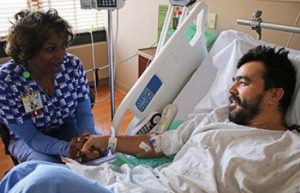Nurses Still Lack Support From Employers on Key Issues
 Nurses need much more support than they are getting from their leadership and employers, a new American Nurses Foundation survey reveals.
Nurses need much more support than they are getting from their leadership and employers, a new American Nurses Foundation survey reveals.
Nurses continue to be stressed, exhausted, and feel lack of support from their employer, according to the comprehensive survey of more than 12,500 nurses nationwide last November as part of the Pulse on the Nation’s Nurses Survey Series. For example:
- 84% recent of nurses say they are stressed or dealing with burnout.
- 57% report feeling exhausted.
- 32% of nurses with less than 10 years of experience indicated being either not or not at all emotionally healthy.
- 61% of nurses under 35 indicated feeling anxious in the previous 14 days.
- 19% intend to leave their position in the next six months; another 27% are considering leaving.
Workplace violence in various forms is also a top issue, with 53% of nurse respondents saying verbal abuse has increased, the report says. Another concern is that 43% of nurses say they either don’t have a reporting mechanism in place at their healthcare system or they are unsure if they have one, according to the survey.
PERCEIVED SUPPORT
Respondents said they continue to feel unsupported or not supported enough by their employers—particularly those employed in large and mid-sized acute care settings, and the younger generation of nurses.
The nursing survey applied the Survey of Perceived Organizational Support (SPOS), a validated measure of the general belief held by an employee that the organization is committed to them, values their continued contributions, and is generally concerned about their well-being.
The foundation tracks five indicators regularly to measure how nurses perceive the support they receive. They scored their employer support on a range of 0 to 5, with 5 being the highest:
- My organization really cares about my well-being – 2.8
- If I did the best job possible, my organization would notice – 2.7
- My organization takes pride in my accomplishments at work – 2.9
- My organization values my contributions to its well-being – 2.8
- My organization responds to my complaints – 2.6
Indeed, a generational divide is evident throughout the data. Overall, nurses 25-34 provided the lowest scores across all SPOS indicators, followed by nurses 35-44 and under 25. The pivot toward higher SPOS scores begins with nurses 45-54.
“This is consistent with reported feelings, with younger nurses feeling less supported and less valued,” the report reads.
“The insights we’ve gleaned from Millennial and GenZ nurse respondents, as well as nurses of color, demonstrate that employers must dramatically shift their approach to supporting nurses, taking into account that different demographics of nursing have unique needs,” says Kate Judge, the foundation’s executive director.
“Nurses leaving the profession, leaving acute care, and being burned out puts our health as a nation at risk,” she says.
That may seem evident as nurses have staged several strikes in the last year at health systems across the country, citing staffing concerns, including:
- More than 7,000 nurses at two of New York City’s busiest hospitals walked out for three days last month.
- Some 15,000 Minnesota nurses went on strike for three days in September.
- About 800 nurses at St. Vincent Hospital in Worcester, Massachusetts, ratified a new contract after a 301-day strike.
One survey respondent expressed frustration: “Employers see nurses as expendable. There’s no retention plan in place, and I feel like the unit wouldn’t care if I left nursing altogether.”
Another shared, “I have seen more nurses recommend other career choices to friends and family. I have seen many caring people step aside from nursing, because they have found it is no longer worth it.”
PERCEPTION GAPS
Besides the generational divide evident throughout the data, the survey also revealed a considerable gap between nurses and nurse leaders.
When nurses were asked whether they feel their team is better prepared for a future variant, surge, or pandemic, only 30% said “yes,” with 29% “maybe” and 41% “no.”
When the same question was asked in an October 2022 survey fielded by the American Organization of Nursing Leadership (AONL), 65% of nurse leaders said “yes,” they felt their team was better prepared for a future variant, surge, or pandemic.
“The divide has real consequences,” the report says, “that go beyond work culture.”
(This story originally appeared in Health Leaders.)




